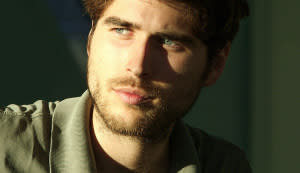New PBS Documentary on Youth Prison Finds Salvation in the Arts: 'It's Important to Incentivize Hope'
Ben Lear, the son of TV pioneer Norman Lear, initially wanted to make a scripted movie that dealt with prison.
But as part of his research, he got to know some jailed juveniles in the Los Angeles area and found their stories incredibly compelling. The scripted idea was scrapped in favor of a documentary.
“I remember being nervous and not knowing what to expect, and being immediately put at ease when I met all of them,” Lear, 28, says of his first meeting with the minors. “They were so young and ‘teenagery’ in every way, I just felt an immediate affinity.”
“I realized I hadn’t seen these kids depicted on film before,” he says.
Lear’s directorial debut, the documentary They Call Us Monsters, questions the legitimacy of giving long-term sentences — including life behind bars — to those whose crimes were committed when they were kids. The film airs at 10 p.m. ET Monday on the PBS series Independent Lens.
On that first outing, Lear and his film partner, writer-producer Gabriel Cowan, met the incarcerated boys after they agreed to teach a writing class. Cowan emerged from that experience with the idea of guiding the kids to write a screenplay informed by their lives.
Thus, a 10-week screenwriting class becomes the backdrop to the film, along with a parallel California legislative debate about reducing sentences for minor offenders.
The film does not shy away from the damage caused by the juveniles’ crimes.
Of the three young men it follows, Antonio faces 90 years to life for two attempted murders committed just after he turned 14. Another, Juan, who joined a gang before his 13th birthday, faces 90 years for an alleged point-blank shooting murder. Jarad, 16, faces 200 years to life, accused of four attempted murders in a drive-by shooting that left a girl in a wheelchair.
Interviews with victims and their families reveal “some of them just want these kids to be thrown away,” says Cowan, 43.
But that’s not what Lear wants.
“On a most basic level, I want people to get to know these kids and meet them, possibly for the first time ever,” Lear says.
• Want to keep up with the latest crime coverage? Click here to get breaking crime news, ongoing trial coverage and details of intriguing unsolved cases in the True Crime Newsletter.

“The takeaway that I had, that I would love for people to have, is that creating opportunities for young people to earn second chances is a good idea,” he says. “It’s important to incentivize hope for young people that are going to prison, so they can make good on their sort of natural ability to change.”
“The bottom line is, you don’t know who a 15-year-old’s going to be 10 years later. It’s important to know, he could still be that same violent dangerous criminal. But he could very well transform and grow into himself and grow out of criminality.”
By leaving them behind bars, Lear says, “you’re just wasting a life.”
Neither filmmaker is naïve about the challenges encountered by the kids they met in lockup. One scene in the documentary shows them in the writing class discussing the first time they saw a dead body or watched someone be killed. “Each of them have a pretty dark story about that experience,” Cowan says.
A loss of innocence soon becomes a thread in the screenplay the boys develop, “which they very quickly filter through their own life experience,” he adds.
Both Cowan and Lear now work with the writing program, InsideOut Writers, depicted in their film. Lears describes it as “one of the beating hearts of the juvenile justice movement in Los Angeles.”
Says Cowan: “Very early on when Ben and I were learning about the juvenile justice system, a number of things became apparent. Number one, the adult prison system is meant to punish. The juvenile system is meant to rehabilitate, but it’s not functioning that way.”
In the Los Angeles area, more than 60 percent of juveniles who are locked up and released wind up behind bars again, he says.
“The truth is that with trauma, you can’t punish trauma out of somebody,” Cowan says. “You have to love it out of them, and that’s why these arts programs do so well for these kids. They’re able to express themselves and hit the release valves on some of the trauma that’s happening to them.”
“We’d like to shed light, not add heat, to this issue,” he says.
They Call Us Monsters airs at 10 p.m. ET Monday on the PBS series Independent Lens.
